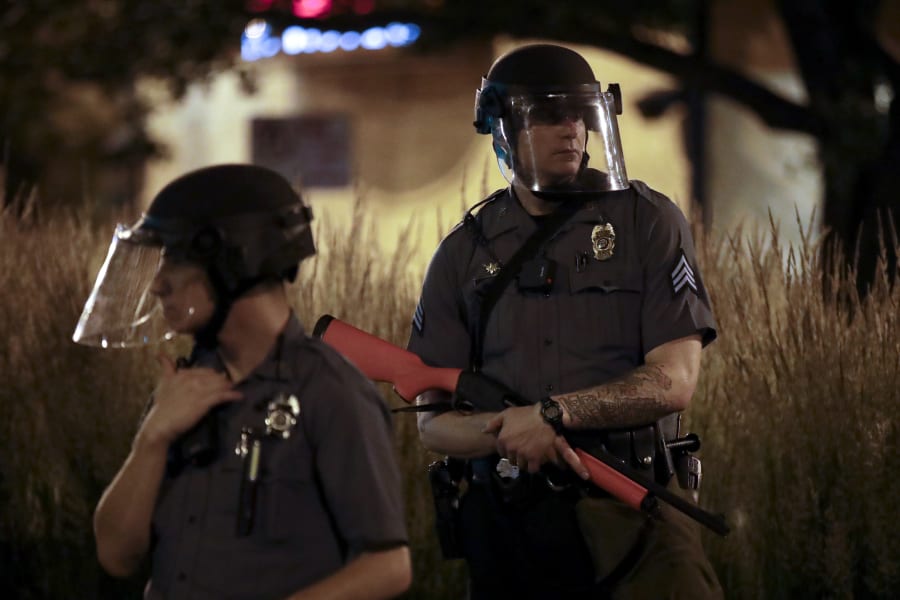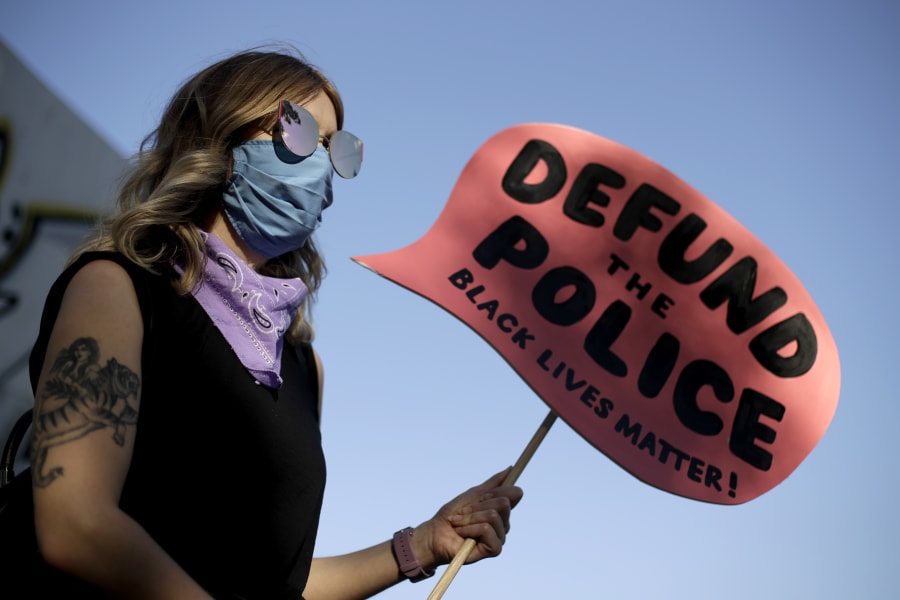KANSAS CITY, Mo. – Leaders in largely Democratic Kansas City, Missouri, don’t control the city’s police department, hire the police chief or determine how the department spends its tax dollars. A 1930s-era law gives that power to a five-member board largely appointed by the Missouri governor, who since 2017 has been a Republican.
A longstanding dispute over that arrangement is erupting this summer. The two sides are preparing for a statewide vote in November on a constitutional amendment that would give the Republican-majority Legislature even more authority to set police funding.
Recommended Videos
A key legislative backer says Kansas City police need the support because some Democrats want to defund the force — a charge city leaders vehemently deny.
A local civil rights leader sued on behalf of city taxpayers, arguing that allowing the state to control the city’s police force amounts to “taxation without representation” and discriminates against Kansas City's large Black population, which experiences much of its violent crime.
Mayor Quinton Lucas, who is the only person on the Board of Police Commissioners not appointed by the governor, has indicated the proposal will be challenged in court.
The debate echoes recent confrontations between Republican state officials and Democratic leaders of larger cities elsewhere over issues including voting rights, mask mandates and recognition of the Juneteenth holiday. And it comes as the nation continues to wrestle with racial injustice in policing.
Last year, Republican Gov. Greg Abbott of Texas and Gov. Brian Kemp of Georgia signed restrictive election laws that opponents claimed targeted Democratic strongholds. And school boards in largely Democratic areas defied governors in Florida, Texas and Arizona who sought to ban mask mandates during the height of the pandemic.
Kansas City, with a population of about 508,000, about 28% Black, is the only Missouri city without local control of its police force. It’s believed to be the largest city in the U.S. in that situation, the mayor’s office said.
After racial injustice protests in 2020 sparked calls for more police accountability, Lucas and some City Council members passed two ordinances that would have given city officials some control over how $42.5 million of the police department’s $239 million budget for 2021-2022 fiscal year would be spent. The money would have been used to emphasize social service and crime prevention programs.
Critics, including the police union and former police chief, said the proposal was a roundabout way of defunding the department and would leave it with insufficient money to make it through the year.
Shortly after the ordinances passed, the state-appointed police board sued the city to undo them and won. The judge said state law gives the board exclusive authority over the police budget.
The fight prompted legislators to pass a bill requiring the city to increase police funding from 20% of its general revenue budget to 25%. Republican Gov. Mike Parson signed the bill June 27.
But there was concern the move would run afoul of a state constitutional ban on unfunded state mandates for cities. So lawmakers put an amendment to address that on the November general election ballot.
Lucas tweeted that “the bill represents the raw exercise of power by state lawmakers over the people of Kansas City,” and would be challenged in court. He and other officials have noted the city already routinely funds the police department above the 20% requirement.
State Sen. Tony Luetkemeyer, a Republican who represents counties in suburban Kansas City, said he sponsored the legislation to stand with law enforcement during a time of “radical attempts across the country by city councils to defund the police.”
Melissa Robinson, a Democratic Kansas City Council member, said the current arrangement disenfranchises Kansas City taxpayers by allowing outsiders to decide how their tax dollars are spent.
She said supporters are strategizing how to persuade residents outside the city that the issue on the November ballot is centered on local control, a principle frequently lauded by Republicans.
“This is not about divisive conversations about blue lives and Black lives,” she said. “It’s the basic question of how government should work ... We never said we wanted to decrease funding, we just wanted to separate out some money and ask questions about better ways to address crime.”
Luetkemeyer said all Missourians should care about how the Kansas City police department operates because the city is one of the main economic drivers in the state.
“If Kansas City sees a dramatic increase in crime because police are defunded, that’s going to have a ripple effect across the entire economy in the state of Missouri,” he said.
According to police department crime statistics, reports of the most serious crimes, such as homicides, sex assaults, robbery, fraud and weapons violations decreased 6% from 2020 to 2021.
Homicides in the city have fluctuated between 151 in 2017 to 157 in 2021, with a high of 179 in 2020. The statistics show 78% of homicide victims in the city in 2021 were Black men and women.
Gwen Grant, president and CEO of the Urban League of Greater Kansas City and the civil rights leader who filed a lawsuit over the funding issue, said the current arrangement is steeped in racism.
During the Civil War, Missouri was sharply divided between Union and Confederate supporters, with much of the Union support centered in St. Louis and Kansas City, which had larger Black populations than elsewhere in the state.
In 1861, Missouri Gov. Claiborne Fox Jackson, who supported the Confederacy, persuaded the Legislature to pass a law giving the state control over the police department in St. Louis. Missouri voters in 2013 approved a constitutional amendment returning that department to local control.
The state took over the new Kansas City Police Department in 1874. That changed in 1932, when the Missouri Supreme Court ruled the appointed board’s control of the agency was unconstitutional.
But the state took back control in 1939 at the urging of another segregationist governor, Lloyd Crow Stark, in part because of corruption under highly influential political organizer Tom Pendergast. In 1943, a new law limited the amount a city could be required to appropriate to a police board to 20% of its general revenue in any fiscal year.
Grant said she did not expect supporters of state control to acknowledge the racist elements of the situation.
“You can’t sidestep that,” she said. “That’s the big elephant in the room ... We are the only city of our size in the country that does not have control of its police department. If state control is so great, why is it that we are the only people with it?”
___
Ballentine reported from Jefferson City, Missouri.



